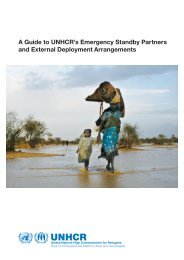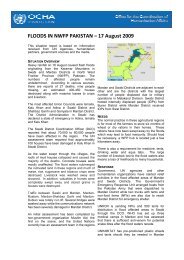Women, Girls, Boys and men - HumanitarianInfo.org
Women, Girls, Boys and men - HumanitarianInfo.org
Women, Girls, Boys and men - HumanitarianInfo.org
You also want an ePaper? Increase the reach of your titles
YUMPU automatically turns print PDFs into web optimized ePapers that Google loves.
Coordination is essential to effective programming<br />
<strong>and</strong> response. When it comes to addressing the<br />
gender di<strong>men</strong>sion of humanitarian responses,<br />
joint planning — the exchange of information <strong>and</strong> collaboration<br />
across the UN system <strong>and</strong> with international<br />
actors, including NGOs <strong>and</strong> local civil society — is crucial.<br />
Establishing a Gender Support Network (GenNet) is one<br />
means of improving coordination (see Box 1 on page 29),<br />
particularly where there are designated gender advisers<br />
<strong>and</strong> <strong>org</strong>anizations that have specific expertise. The main<br />
purpose of the network is to facilitate dialogue, making<br />
sure that people are informed of key issues <strong>and</strong> develop<strong>men</strong>ts<br />
in terms of the changing roles, needs <strong>and</strong> conditions<br />
of wo<strong>men</strong>, girls, boys <strong>and</strong> <strong>men</strong> in the affected community.<br />
It is a means of encouraging more integration of<br />
gender perspectives into all programmes.<br />
cross-cuttIng Issue<br />
Gender equality is not a sector on its own. it is integral to every<br />
issue <strong>and</strong> area of work. it is not a st<strong>and</strong>-alone matter.<br />
A GenNet comprises representatives from the govern<strong>men</strong>t,<br />
civil society, NGOs <strong>and</strong> UN agencies both at the<br />
national <strong>and</strong> local levels. However, a network is only as<br />
effective as its members <strong>and</strong> if the participants are not at<br />
a senior enough level or do not have experience in gender-related<br />
issues they cannot be fully effective.<br />
In complex or large-scale emergencies, an inter-agency<br />
gender expert or adviser to the Humanitarian Coordinator<br />
is also necessary to provide technical support <strong>and</strong><br />
guidance to practitioners, <strong>and</strong> to help adjust program-<br />
coorDInAtIon on<br />
genDer equAlIty<br />
In emergencIes<br />
ming to ensure better coordination <strong>and</strong> integration of<br />
gender perspectives. (See Box 2, page 30, for Terms of<br />
Reference for Gender Experts.)<br />
So why do we have gender advisers? Gender advisers<br />
can provide advice <strong>and</strong> guidance to other technical<br />
experts. They can help to think, plan <strong>and</strong> design assess<strong>men</strong>ts<br />
<strong>and</strong> interventions so that gender di<strong>men</strong>sions are<br />
not lost. They can point to gaps in information <strong>and</strong> data.<br />
Often they are knowledgeable about existing local wo<strong>men</strong>’s<br />
<strong>org</strong>anizations that can provide additional information<br />
<strong>and</strong> ideas for addressing difficult problems. Through<br />
the GenNet they can ensure that there is communication<br />
across sectors.<br />
Isn’t the gender adviser responsible for gender issues?<br />
No. Often we assume that the gender adviser on the<br />
team is responsible for all things related to gender. But<br />
that’s a recipe for failure. Gender advisers are facilitators<br />
of a process — they are there to help technical staff to see<br />
things with a gender lens, to question how things are being<br />
imple<strong>men</strong>ted so that the needs of wo<strong>men</strong>, girls, boys<br />
<strong>and</strong> <strong>men</strong> are being met. They are not there to do all of the<br />
work related to gender — that would defeat the purpose<br />
of mainstreaming.<br />
In addition to the GenNet <strong>and</strong> the gender adviser, it is<br />
important that all actors, as they coordinate, assess, prioritize<br />
<strong>and</strong> imple<strong>men</strong>t programmes, continually ask the<br />
basic questions — are they addressing the differential<br />
needs of wo<strong>men</strong>, girls, boys <strong>and</strong> <strong>men</strong>; are they including<br />
wo<strong>men</strong> <strong>and</strong> <strong>men</strong> in decision-making, drawing <strong>and</strong> building<br />
on their capacities? Whether it is among health workers,<br />
food delivery services, human rights observers, water<br />
<strong>and</strong> sanitation experts or mine action staff, these questions<br />
are pertinent to ensuring an effective response.<br />
C o o R d I n AT I o n o n G e n d e R e q u A l I T y I n e m e R G e n C I e S<br />
cOORDinATiOn











